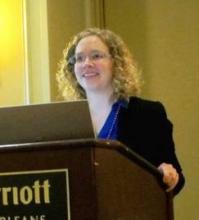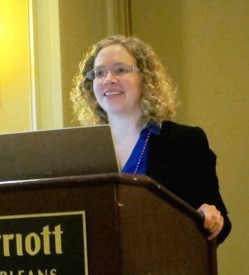User login
NEW ORLEANS – Children admitted to the hospital on the weekend are more likely to bounce back for an unplanned readmission, according to a retrospective study of 40,961 pediatric admissions.
Being admitted to a pediatric hospital on the weekend was associated with higher odds of readmission at 30 days than a weekday admission (odds ratio, 1.14; 95% confidence interval, 1.04-1.25.)
The association remained significant even after adjustment for the child’s age, gender, insurance status, race, length of stay, and primary discharge diagnosis group (OR, 1.15; CI, 1.05-1.27).
"Higher readmission in children admitted on the weekend may indicate decreased in-hospital quality, although certainly this needs to be verified at other institutions," Dr. Katherine Auger said.
She noted that little is known about the "weekend effect" in pediatrics, although studies have shown that adults admitted to the emergency department or who have surgery on the weekend are more likely to die, and that readmissions are higher for certain acute conditions with a weekend admission.
Dr. Auger and her associates analyzed 46,187 admissions at the University of Michigan C.S. Mott Children’s Hospital, Ann Arbor, from January 2008 to December 2012. After excluding 5,226 index admissions for newborns staying less than 5 days and patients who left against medical advice, transferred out, entered hospice care, or died as an inpatient, 40,961 admissions for 24,558 patients remained. Weekend admissions accounted for 6,144 of the cases.
Planned versus unplanned readmissions were identified by hospital admitting category, which in a separate chart review of 200 readmissions demonstrated a 98% specificity for identifying unplanned readmissions and a sensitivity of 86%, said Dr. Auger, now with Cincinnati Children’s Hospital.
At the index admission, 46% of patients were female, 76% were white, 65% had private insurance, and 32.3% stayed at the hospital for 2-3 days.
The 30-day all-cause readmission rate was 14.7% and the unplanned readmission rate 10.2%.
The unplanned 30-day readmission rate was quite a bit higher than reported at national levels using chart review rather than administrative data, she observed. In a recent study (JAMA 2013;309:372-80) involving 568,845 admissions at 72 acute care pediatric hospitals, the 30-day unplanned readmission rate was just 6.5%, but the study excluded many readmissions for specific diagnoses such as when a child was readmitted after chemotherapy.
In the current analysis, unplanned readmissions peaked on Saturday and Sunday at about 11.5%, compared with about 10.5%, for example, on Monday.
Unplanned readmissions were highest in children with an index admission for chemotherapy (32.1%), diseases of the blood (21%), neoplasms (16.2%), and diseases of the gastrointestinal tract (13.2%), Dr. Auger said at the meeting, which was sponsored by the Society of Hospital Medicine, the American Academy of Pediatrics, and the Academic Pediatric Association.
Interestingly, children being discharged on Saturday or Sunday had the lowest rates of readmission. In logistic regression analyses, being discharged on the weekend was actually associated with a decreased likelihood of readmission in the unadjusted model (OR, 0.90; CI, 0.83-0.97), but this was no longer significant in the adjusted model (OR, 0.94; CI, 0.87-1.02), she said.
During a discussion of the results, Dr. Auger said follow-up analyses could be performed to stratify the data by diagnosis or by complex versus uncomplicated conditions. "Kids that are in for cancer may be very different from those in for bronchiolitis," she noted.
Dr. Auger reported salary support from the Robert Wood Johnson Foundation Clinical Scholars program. The study was funded by a grant from the Blue Cross Blue Shield of Michigan Foundation.
NEW ORLEANS – Children admitted to the hospital on the weekend are more likely to bounce back for an unplanned readmission, according to a retrospective study of 40,961 pediatric admissions.
Being admitted to a pediatric hospital on the weekend was associated with higher odds of readmission at 30 days than a weekday admission (odds ratio, 1.14; 95% confidence interval, 1.04-1.25.)
The association remained significant even after adjustment for the child’s age, gender, insurance status, race, length of stay, and primary discharge diagnosis group (OR, 1.15; CI, 1.05-1.27).
"Higher readmission in children admitted on the weekend may indicate decreased in-hospital quality, although certainly this needs to be verified at other institutions," Dr. Katherine Auger said.
She noted that little is known about the "weekend effect" in pediatrics, although studies have shown that adults admitted to the emergency department or who have surgery on the weekend are more likely to die, and that readmissions are higher for certain acute conditions with a weekend admission.
Dr. Auger and her associates analyzed 46,187 admissions at the University of Michigan C.S. Mott Children’s Hospital, Ann Arbor, from January 2008 to December 2012. After excluding 5,226 index admissions for newborns staying less than 5 days and patients who left against medical advice, transferred out, entered hospice care, or died as an inpatient, 40,961 admissions for 24,558 patients remained. Weekend admissions accounted for 6,144 of the cases.
Planned versus unplanned readmissions were identified by hospital admitting category, which in a separate chart review of 200 readmissions demonstrated a 98% specificity for identifying unplanned readmissions and a sensitivity of 86%, said Dr. Auger, now with Cincinnati Children’s Hospital.
At the index admission, 46% of patients were female, 76% were white, 65% had private insurance, and 32.3% stayed at the hospital for 2-3 days.
The 30-day all-cause readmission rate was 14.7% and the unplanned readmission rate 10.2%.
The unplanned 30-day readmission rate was quite a bit higher than reported at national levels using chart review rather than administrative data, she observed. In a recent study (JAMA 2013;309:372-80) involving 568,845 admissions at 72 acute care pediatric hospitals, the 30-day unplanned readmission rate was just 6.5%, but the study excluded many readmissions for specific diagnoses such as when a child was readmitted after chemotherapy.
In the current analysis, unplanned readmissions peaked on Saturday and Sunday at about 11.5%, compared with about 10.5%, for example, on Monday.
Unplanned readmissions were highest in children with an index admission for chemotherapy (32.1%), diseases of the blood (21%), neoplasms (16.2%), and diseases of the gastrointestinal tract (13.2%), Dr. Auger said at the meeting, which was sponsored by the Society of Hospital Medicine, the American Academy of Pediatrics, and the Academic Pediatric Association.
Interestingly, children being discharged on Saturday or Sunday had the lowest rates of readmission. In logistic regression analyses, being discharged on the weekend was actually associated with a decreased likelihood of readmission in the unadjusted model (OR, 0.90; CI, 0.83-0.97), but this was no longer significant in the adjusted model (OR, 0.94; CI, 0.87-1.02), she said.
During a discussion of the results, Dr. Auger said follow-up analyses could be performed to stratify the data by diagnosis or by complex versus uncomplicated conditions. "Kids that are in for cancer may be very different from those in for bronchiolitis," she noted.
Dr. Auger reported salary support from the Robert Wood Johnson Foundation Clinical Scholars program. The study was funded by a grant from the Blue Cross Blue Shield of Michigan Foundation.
NEW ORLEANS – Children admitted to the hospital on the weekend are more likely to bounce back for an unplanned readmission, according to a retrospective study of 40,961 pediatric admissions.
Being admitted to a pediatric hospital on the weekend was associated with higher odds of readmission at 30 days than a weekday admission (odds ratio, 1.14; 95% confidence interval, 1.04-1.25.)
The association remained significant even after adjustment for the child’s age, gender, insurance status, race, length of stay, and primary discharge diagnosis group (OR, 1.15; CI, 1.05-1.27).
"Higher readmission in children admitted on the weekend may indicate decreased in-hospital quality, although certainly this needs to be verified at other institutions," Dr. Katherine Auger said.
She noted that little is known about the "weekend effect" in pediatrics, although studies have shown that adults admitted to the emergency department or who have surgery on the weekend are more likely to die, and that readmissions are higher for certain acute conditions with a weekend admission.
Dr. Auger and her associates analyzed 46,187 admissions at the University of Michigan C.S. Mott Children’s Hospital, Ann Arbor, from January 2008 to December 2012. After excluding 5,226 index admissions for newborns staying less than 5 days and patients who left against medical advice, transferred out, entered hospice care, or died as an inpatient, 40,961 admissions for 24,558 patients remained. Weekend admissions accounted for 6,144 of the cases.
Planned versus unplanned readmissions were identified by hospital admitting category, which in a separate chart review of 200 readmissions demonstrated a 98% specificity for identifying unplanned readmissions and a sensitivity of 86%, said Dr. Auger, now with Cincinnati Children’s Hospital.
At the index admission, 46% of patients were female, 76% were white, 65% had private insurance, and 32.3% stayed at the hospital for 2-3 days.
The 30-day all-cause readmission rate was 14.7% and the unplanned readmission rate 10.2%.
The unplanned 30-day readmission rate was quite a bit higher than reported at national levels using chart review rather than administrative data, she observed. In a recent study (JAMA 2013;309:372-80) involving 568,845 admissions at 72 acute care pediatric hospitals, the 30-day unplanned readmission rate was just 6.5%, but the study excluded many readmissions for specific diagnoses such as when a child was readmitted after chemotherapy.
In the current analysis, unplanned readmissions peaked on Saturday and Sunday at about 11.5%, compared with about 10.5%, for example, on Monday.
Unplanned readmissions were highest in children with an index admission for chemotherapy (32.1%), diseases of the blood (21%), neoplasms (16.2%), and diseases of the gastrointestinal tract (13.2%), Dr. Auger said at the meeting, which was sponsored by the Society of Hospital Medicine, the American Academy of Pediatrics, and the Academic Pediatric Association.
Interestingly, children being discharged on Saturday or Sunday had the lowest rates of readmission. In logistic regression analyses, being discharged on the weekend was actually associated with a decreased likelihood of readmission in the unadjusted model (OR, 0.90; CI, 0.83-0.97), but this was no longer significant in the adjusted model (OR, 0.94; CI, 0.87-1.02), she said.
During a discussion of the results, Dr. Auger said follow-up analyses could be performed to stratify the data by diagnosis or by complex versus uncomplicated conditions. "Kids that are in for cancer may be very different from those in for bronchiolitis," she noted.
Dr. Auger reported salary support from the Robert Wood Johnson Foundation Clinical Scholars program. The study was funded by a grant from the Blue Cross Blue Shield of Michigan Foundation.
AT PEDIATRIC HOSPITAL MEDICINE 2013
Major finding: The 30-day all-cause readmission rate was 14.7% and the unplanned readmission rate 10.2%.
Data source: Retrospective administrative data and chart review of 40,961 admissions in 24,558 children.
Disclosures: Dr. Auger reported salary support from the Robert Wood Johnson Foundation Clinical Scholars program. The study was funded by a grant from the Blue Cross Blue Shield of Michigan Foundation.

